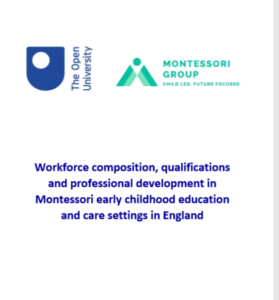By Professor Jane Payler
‘Why would anyone want to come into the early years sector any more, the pay is dreadful, we are undervalued by the Government and even though we desperately want to give our staff more money, we can’t. The 30 hrs and the free entitlement has had an impact on how on parents view our profession.’ (Payler & Bennett, 2020:37)

There can be no doubt that the Covid-19 pandemic has highlighted the crucial role that ECEC plays in our society. In spite of confusing and changing messages to the sector from the government in the early stages of the pandemic, the country was reminded nonetheless that ECEC provides a key service, caring for and educating our richest resource as a nation, our current precious youngest citizens and our future adults. Yet, we have a sector that has been let down by a lack of coherent government strategy and investment for workforce and professional development over the past ten years. Just as the quality of our teachers in schools, their training and the resources available to them are crucial to the quality of older children’s education, so too is the quality of experiences for young children dependent on staff, their training, professional development and the level of resource available for ECEC provision. We have a sector working hard to do their very best for young children and families. But instead of seeing government-led development and improvement since 2010, we have seen the sector let down in England by insufficient funding, a loss of strategy to ensure a well-qualified graduate-led workforce and a huge loss of local authority resource for training, quality improvement and support (e.g. see Pascal et al. 2020 here). In this context, our research funded by Montessori St. Nicholas Charity examines the workforce and professional development issues faced by Montessori settings in England (see our full report here). We found that although Montessori settings in the survey had well qualified, experienced staff and higher Ofsted ratings, there were nonetheless threats to maintaining qualification levels, difficulties in professional development and poor external recognition of Montessori qualifications. The range of difficulties faced in Montessori settings regarding professional development are mainly high costs, staff cover, poor timing of courses, accessibility of courses and difficulties in deciding which courses are worth doing. Settings reported fewer accessible choices for professional development at greater costs and with less assurance of making the right choices for quality enhancement and value. The future supply of a trained Montessori workforce was seen to be insecure and currently has limited diversity, while Montessori provision is more likely to be in areas of lower disadvantage and, within settings, higher qualified staff are usually deployed with older children. Young children, their families and the ECEC workforce deserve better.
References
Pascal, C., Bertram, T. & Cole-Alback, A. (2020) Early Years Workforce Review: Revisiting the Nutbrown Review – Policy and Impact. London, Sutton Trust. Available at http://www.crec.co.uk/docs/Early%20Years%20Workforce%20Review%20for%20Sutton%20Trust%20August%202020.pdf. Accessed 20.9.2020.
Payler, Jane and Bennett, Stephanie (2020). Workforce composition, qualifications and professional development in Montessori early childhood education and care settings in England. Montessori St. Nicholas Charity, & OU, Milton Keynes, UK. Available online at http://oro.open.ac.uk/72360/1/Open%20University%20Montessori%20final%20research%20report%2021%20Sept%202020.pdf. Accessed 25.9.2020.
